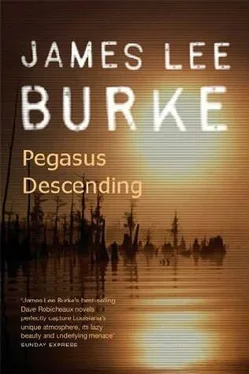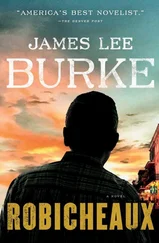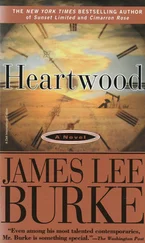I took the bag from him, shook the joints out, and ground them under my heel. “So you’re not holding now,” I said, and stuffed the bag back in his pocket.
I started walking toward the cruiser, with Tony perhaps ten feet behind me. I heard him quicken his step to catch up with me.
“That was a pretty decent thing to do, Mr. Robicheaux,” he said.
“Don’t deceive yourself, kid. What I told you back there in the trees wasn’t a ruse. You had your chance and you blew it. The people I work with are going to twist your head off and spit in it,” I replied.
I HAD NOT SEEN Clete Purcel since Saturday evening, when he had driven away from the boat landing at Henderson Swamp with Trish Klein, his face and hers glowing like those of youthful lovers in the sunset. I left three messages on his cell phone, and also went by his office, only to find it closed. Friday I went by his office again, and this time his part-time secretary, Hulga Volkmann, was behind the desk. She was a big, rosy-complected, cheerful, and scatterbrained woman who wore flower-print dresses and perfume that would numb the olfactory senses of an elephant.
“He went to New Orleans for a day or so, then called from Cancún. He’ll be back tonight,” she said.
“Clete’s in Mexico?” I said.
“Or was it Bimini?” she said.
Clete Purcel’s romantic problems did not occur as a result of his having love affairs with biker girls and neurotic artists and strippers. Instead, they usually began when he got involved with any woman who was halfway normal, in other words, the type of person he didn’t believe he deserved. Any attempt to convince him that he was attractive to women other than pipeheads and narcissistic meltdowns was futile. In Clete’s mind, he was still the son of a milkman in the Irish Channel, with skinned knuckles from fights on the school ground and welts across his butt from his father’s razor strop. Nice girls didn’t hang with a guy who had a scar like a pink inner-tube patch through one eyebrow, put there by a black warlord from the Gird Town Deuces. Nice girls didn’t hang with a former jarhead who still heard the downdraft of helicopter blades in his sleep.
“Is Clete with a lady by the name of Trish Klein?” I asked the secretary.
“He was with someone. I heard a lot of noise in the background. I think he was in a casino,” Hulga said.
Clete lived down the bayou in a Depression-era motor court, one that still did not have telephones in the cottages and was covered by the shade of oaks hundreds of years old. At ten Saturday morning, I knocked on his door. He answered it in his skivvies and an undershirt, smiling sleepily. “How you doin’, big mon?” he said. A square bandage was taped high up on his left shoulder.
“Why don’t you tell your friends where you are once in a while?”
“Oh, Trish and I drove over to the Big Sleazy for the day, then one thing led to another. You know how it goes. You want coffee?”
“I don’t want to hear Darwin ’s history of the planet. Did you let her hustle you?”
“Lighten up on the terminology,” he replied, filling a metal coffeepot at the sink.
“What happened to your shoulder?”
“Nothing. A scratch. I had to get a tetanus shot.”
“I think Trish Klein is playing you, Cletus,” I said, instantly regretting my words.
“Hell, yes. Why would a great-looking broad be interested in an over-the-hill P.I. who’s got a worse jacket than most perps?”
“I didn’t say that. Your weakness is your good heart. People take advantage of it.”
“Good try. Get the milk out of the icebox, will you? God!”
“God what?”
“I woke up feeling great. I haven’t had any booze in two days. Trish and I are going to a street dance in Lafayette tonight. Then you come in here and walk around on my libido with golf shoes. Plus you insult Trish.”
“I worry about you. You were gone four days without telling me where you were.”
He tossed a loaf of bread into my hands. “Make some toast.”
“What happened in New Orleans?”
“Ever hear of a guy named Lefty Raguza?”
“He’s a psychopath who works for a bookie and general shithead by the name of Whitey Bruxal.”
“I had to straighten him out. It wasn’t a major event. You don’t figure him for a listener, huh?”
“What have you done, Clete?”
Then he told me of the beginnings of his romantic involvement with the girl whose nickname he had taken from a song by Jimmy Clanton.
LAST SUNDAY MORNING he and Trish Klein had headed down the four-lane toward New Orleans, the top down, the cane blowing in the fields on each side of them, then they skirted a sun-shower at Morgan City and turned into a convenience store to put up the top. It was still early and there were few vehicles on the highway. A Ford Explorer that had been a quarter mile behind Clete went past the convenience store, a blond man at the wheel, then the road was empty again, the wind balmy and flecked with rain.
“I love it here. You can almost smell the Gulf. That’s the only thing I miss about Miami -the smell of the ocean in the morning,” Trish said.
“You lived by the water?” Clete said.
She had taken a bandanna off her head and was shaking out her hair. Clete couldn’t keep his eyes off her. Nor could he read her or her intentions, or judge whether or not he had any chance with her. All he knew was she had the most beautiful blue eyes and heart-shaped face he had ever seen. “We had a house in Coconut Grove. My grandmother kept a sailboat. We used to sail down into the Keys when the kingfish were running,” she said.
“That must have been great,” he said, his gaze wandering over her eyes and mouth, her words not really registering.
“You want to go now?” she asked.
“Pardon?”
“It’s starting to rain.”
“Right,” he said.
They drove back onto the four-lane and crossed the bridge over the wide sweep of the Atchafalaya River. From the bridge’s apex, Morgan City looked like a Caribbean port, with its palm-dotted streets, red-tiled roofs, biscuit-colored stucco buildings, and shotgun houses fronted by ceiling-high windows and ventilated green shutters. As Clete descended the bridge, he glanced into the rearview mirror and saw the Ford Explorer again. The blond man was hunched over the wheel, wearing shades, cutting in and out of the passing lane. Then he dropped behind a semi and disappeared from view.
Clete and Trish crossed another bridge at Des Allemands and ate deep-fried soft-shell crabs in a restaurant by a waterway where the banks were still thickly wooded and undeveloped and houseboats were moored under the overhang of the trees. When they got back on the highway, Clete saw the Explorer swing behind him. Clete took the exit to Luling and approached the huge steel bridge spanning the Mississippi. The Explorer dropped back four cars but stayed with him.
At one point the blond man threw some trash out the window, perhaps a fast-food container, something that splattered and bounced across the pavement.
“Know anybody who drives a dark green Explorer?” Clete said.
“Nobody I can think of.” Trish leaned forward so she could see into the side mirror. “I don’t see one. Where is it?”
“He’s about three cars back now. A blond guy with shades on, throwing garbage on the road.”
“No, that doesn’t sound like anybody I know. He’s following us?”
“He’s probably just a jerk. Sometimes I think we should make littering a capital offense, you know, have a few roadside executions. It would really solve a lot of environmental problems here.”
He could feel her looking at the side of his face. When he glanced at her, she was smiling, her eyes lit with a tenderness that made his loins go weak.
Читать дальше












